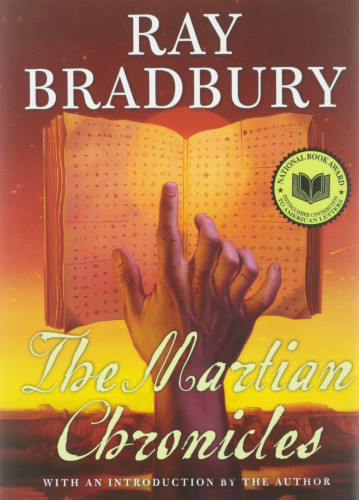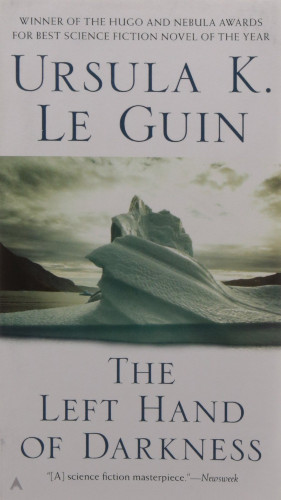This week I decided to read something a bit different, The Martian Chronicles by Ray Bradbury, which is a series of stories describing humans colonization of Mars. Science fiction allows an author to make a commentary on humanity, or actions that humanity has taken in the past, and comment on them, in a way that allows them to be discussed without necessarily bringing up the reader’s prior associations with the event. By taking the context and freeing it from having anything to do with reality, such as moving it to an alien world, we can more objectively look at our actions and consider and judge them without our prior thoughts and biases influencing our perceptions.
Early on in the book an expedition from Earth arrives on Mars and encounters its inhabitants, but they don’t quite get the welcome that they are expecting. After being passed around from person to person the following encounter takes place:
Mr. Iii answered his door. He was on his way to a lecture, but he had a minute, if they would hurry inside and tell him what they desired. . . .
“A little attention,” said the captain, red-eyed and tired. “We’re from Earth, we have a rocket, there are four of us, crew and captain, we’re exhausted, we’re hungry, we’d like a place to sleep. We’d like someone to give us the key to the city or something like that, and we’d like somebody to shake our hands and say ‘Hooray’ and say ‘Congratulations, old man!’ That about sums it up.”
As we’re just now seriously considering the possibility of a manned mission to Mars, an event unprecedented, since the Moon landing, it would be probably the greatest accomplishment in human history to date. It’s funny but also kind of sad that they end up among a group that care nothing for their achievement, as they’re expecting them to have the same values and level of appreciation, when they know nothing about them.
Later after the initial pioneers have proved it’s possible to travel to Mars, echoing the European colonization of the Americas, the common people quickly follow suit and work to change things to feel more like home, as Bradbury says:
The rockets came like locusts, swarming and settling in blooms of rosy smoke. And from the rockets ran men with hammers in their hands to beat the strange world into a shape that was familiar to the eye, to bludgeon away all the strangeness, their mouths fringed with nails so they resembled steel-toothed carnivores, spitting them into their swift hands as they hammered up frame cottages and scuttled over roofs with shingles to blot out the eerie stars, and fit green shades to pull against the night.
Even as far from home as being on another planet, it is still typical of us to want to change things to suit our tastes, not being content just to survive, but to need bring along all of the comforts of home as well.
I was reminded of another science fiction book I’d read recently, The Left Hand of Darkness by Ursula K. Le Guin in which a single human emissary visits a planet on which the inhabitants are androgynous until it is time to mate, when they take on a particular gender. The book opens with a brief introduction from Le Guin in which she explains that much science fiction is a thought experiment, in which the possibilities of a particular scenario are explored.
In the introduction, Le Guin explains the role of fiction writers in explain truths about humanity and human nature through the use of, what are essentially, lies, saying:
“The truth against the world!”—Yes. Certainly. Fiction writers, at least in their braver moments, do desire the truth: to know it, speak it, serve it. But they go about it in a peculiar and devious way, which consists in inventing persons, places, and events which never did and never will exist or occur, and telling about these fictions in detail and at length and with a great deal of emotion, and then when they are done writing down this pack of lies, they say, There! That’s the truth!
By imagining a planet of androgynous beings, Le Guin can explore the possibilities of gender equality without the restrictions of an Earth-like environment. The book’s human narrator explains the problem in trying to deal with a race without a definite gender, when gender is a fundamental aspect of our thought processes, saying:
When you meet a Gethenian you cannot and must not do what a bisexual naturally does, which is to cast him in the role of Man or Woman, while adopting towards him a corresponding role dependent on your expectations of the patterned or possible interactions between persons of the same or the opposite sex. Our entire pattern of socio-sexual interaction is nonexistent here. They cannot play the game. They do not see one another as men or women. This is almost impossible for our imagination to accept. What is the first question we ask about a newborn baby?
By combing both male and female traits into a single being, Le Guin creates a world in which many of the problems caused by differences in gender have been eliminated, but is still far from perfect, illustrating that some problems are caused by our fundamental nature. Without gender in some ways communication becomes easier for them, as they have the same basis upon which they perceive the world, but makes it quite difficult for the narrator, who has to figure out how to deal with the blended communication styles.
With the freedom to imagine impossible scenarios science fiction writers can make points that would otherwise be difficult or impossible to do in the context of dealing with only humans on the planet Earth. An intriguing context could also draw in readers and expose them to a message that might not receive elsewhere by wrapping a message in a story in which things can be taken to extremes to more fully explore a point.


